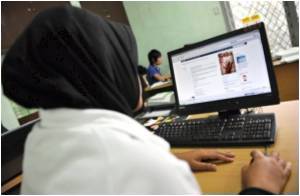A primary school became the first in Britain to provide every child with a computerised translator, since more than 50 percent students in the school do not speak English.

Children type questions into the computer in their native language, which are translated out loud into English for the teacher.
Teachers type instructions for pupils which can be translated back into 25 different languages.
English-speaking pupils also use the translator to communicate with foreign classmates
Manor Park Primary School in Aston, Birmingham, is the first in the UK to give the "Talking Tutor" software to every student.
But some like Nick Seaton, chairman of the Campaign for Real Education, are unhappy with the move.
Advertisement
Seaton added: "There is a danger that this computer translator will keep children within their own social group, which could be damaging to their future prospects.
Advertisement
Head teacher Jason Smith has, however, come forward in the scheme's defence.
He said: "It can vary but at any one time we have 30-plus languages being spoken at the school, so this is invaluable to us. Last week we enrolled a pupil from Gambia who could speak only a tribal language, so we checked online to see if we had something that closely matched.
We found the closest match and both child and parent could understand us."
The school will spend 700pound a year for the software, which comes with on-screen pictures based on the ethnic background of the pupils.
Developed by Lincoln-based EMAS UK, at a cost of more than 2.5million pounds, the software translates English into 25 languages including Polish, Urdu and Chinese. A further 200 can be translated on-screen.
Smith said: "Just because English isn't a pupil's first language, it doesn't mean they aren't academically gifted, so this allows us to assess them in their own language while helping them with their English at the same time."
Source-ANI








